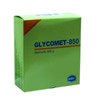
GLYCOMET INDICATIONS
Glycomet is used to treat type 2 (noninsulin-dependent) diabetes. Glycomet (Generic Glucomin) decreases the amount of glucose you absorb from your food and the amount of glucose made by your liver. Glycomet (Generic Glucomin) increases your body's response to insulin, a natural substance that controls the amount of glucose in the blood.
GLYCOMET INSTRUCTIONS
Take exactly as prescribed by your Health Provider. Do not stop taking this medication with out consulting your Health provider first.
If you miss a dose of Glycomet, take as soon as possible. Do not double doses.
GLYCOMET STORAGE
Mostly you will be prescribed one 500mg Glycomet (Generic Glucomin) tablet 3 times a day, while the 850mg tablets are usually taken twice daily to give effective diabetes control. You should use Glycomet (Generic Glucomin) only as directed by your doctor.
GLYCOMET STORAGE
Store Glycomet below 86 degrees F (30 degrees C). Store away from heat, moisture, and light. Do not store in the bathroom. Keep Glycomet out of the reach of children and away from pets.
Tell your doctor If you have had:
- a history of heart,
- thyroid disease, or
- pituitary;
- any adrenal gland problems;
- hormone problems; or
- a severe infection.
Tell your doctor about all kind of medications you are taking, as these may interfere with the ability of Glycomet (Generic Glucomin) to control your blood sugar level.
If you have any of these symptoms, eat or drink a food or beverage with sugar in it, and call your doctor immediately; the side effects include:
- fast heartbeat
- sweating
- confusion
- vision problems
- shakiness
- dizziness
- numbness/tingling of the mouth
- fatigue
If you have any of these symptoms, call your doctor immediately:
- trouble breathing
- thirst
- dry mouth
- flushing
- dry skin
- loss of appetite
- frequent urination
Glycomet may cause side effects. Tell your doctor if any of these symptoms are severe,or do not go away:
- bloating
- stomach pain
- constipation
- diarrhea
- stomach upset
- vomiting
- heartburn
- flushing of the skin
- sweating
The following symptoms are uncommon, but if you experience any of them, call your doctor immediately: chest pain, rash.